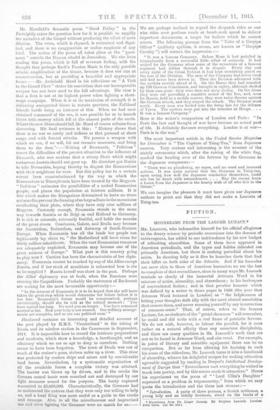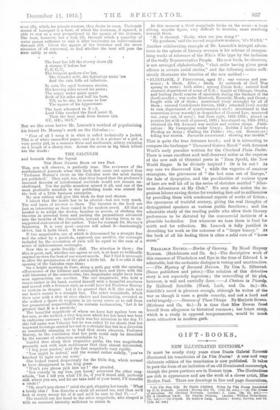FICTION.
MOONBEAMS FROM THE LARGER LUNACY.*
Ma. LEACOCK, who indemnifies himself for his official' allegiance to the dreary science by periodic excursions into the domain of extravaganza, has added to our indebtedness by his new budget of refreshing absurdities. Some of them have appeared in American periodicals, and the types and foibles ridiculed are primarily American, but there is nothing parochial about his satire. In shooting folly as it flies he launches darts that find their billet on both sides of the Atlantic. And if his formulas are more akin to those of American humorists we are the last to complain of that resemblance, since in many ways Mr. Leacook reminds us closely of the immortal Artemus Ward in his mixture of satire, absurdity, and shrewdness ; in his burlesques of conventional fiction ; and in that peculiar humour which was defined by a writer in these pages in 1886 (the year that Artemus Ward lectured in London) as " the helplessness of letting your thoughts drift idly with the most absurd association that crosses them, and never rescuing yourself by any insurrection of common-sense." That, of course, refers to the famous Lecture, for, as students of the "genial showman" will remember, he could and did write with a real flame of patriotic fervour. We do not wish, however, to labour the parallel, for it rests rather on a natural affinity than any conscious discipleship, and there are many qualities in Mr. Leacock's work that are not to be found in Artemus Ward, and vice vered. For example, in point of literary and scientific equipment there can be no comparison. But so far from allowing his learning to curb his sense of the ridiculous, Mr. Leaeock turns it into a handmaid of absurdity, witness his delightful recipes for making education agreeable suggested by reading in Draper's Intellectual Develop. 'runt of Europe that "Eratosthenca cast everything he wished to teach into poetry, and by this means made it attractive." Hence his experiment on the poem of " ' Lord Ullin's Daughter' expressed as a problem in trigonometry," from which we may quote the introduction and the three last stanzas :— " Introduction. A party of three persons, a Scotch nobleman, a young lady and an elderly boatman, stand on the banks of a Moonbeams Iron the Larger Lunacy. By btophon Leacock. London; John Lane. 13e. ad. not.1
river (R), which, for private reasons, they desire to cross. Their only means of traneport is a boat, of which the boatman, ifsquared, is able to row at a rate proportional to the square of the distance, The boat, however, has a leak (5), through whieh a quantity of water passes sufficient to sink it after traversing an indeterminate distance (0). Given the square of the boatman and tho mean situation of all concerned, to find whether the boat will pass the giver safely or sink.
• • • • The boat has left the stormy shore (3) A stormy C before her
CI Cs 0304
The tempest gathers o'er her,
The thunder rolls' the lightnings smite 'am
And tho rain falls ad infinitum.
In vain the aged boatman strains, His heaving sides reveal his pains ; The angry water gains apace Both of his sides and half his base, Till, as he sits, he seems to lose The square of his hypotenuse.
The boat advanced to X4-2, Lord Ullin reached the fixed point Q, Then the boat sank from human eye, OY, OYs, OGY."
But we like even better Mr. Leaeock's method of popularizing his friend Dr. Murray's work on the Calculus :— "First of all I wrap it in what is called technically a jacket. This is of white enamelled paper, and on it is a picture of a girl, a very pretty girl, in a summer dress and sunbonnet, sitting swinging on a bough of a cherry -tree. Across the cover in big black letters are the words THE CALCULUS and beneath them the legend
THE MOST DARING Boon we TER DAT.
This, you will observe, is perfectly true. The reviewers of the mathematical journals when this book first came out agreed that • Professor Murray's views on the Calculus were the most daring yet published.' They said, too, that they hoped that the professor's unsound theories of infinitesimal rectitude would not remain un- challenged. Yet the nubile somehow missed it all, and one of the most profitable scandals in the publishing trade was missed for the lack of a little business enterprise. My new edition will give this book its first real chance. I admit that the inside has to be altered—but not very much. The real basis of interest is there. The theories in the book are just as interesting as those raised in the modern novel. All that is needed is to adopt the device, familiar in novels, of clothing the theories in personal form and putting the propositions advanced into the 'mouths of the characters, instead of leaving them as un- supported statements of the author. Take for example Dr. Murray's beginning. It is very good—anyone will admit it—fascinatingly clever, but it lacks heart. It runs :
If two magnitudes, one of which is determined by a straight line and the other by a parabola, approach one another, the rectangle included by the revolution of each will be equal to the sum of a eel-ice of indeterminate rectangles.
Now this is—quite frankly—dull. The situation is there ; the Idea is good, and, whether one agrees or not, is at least as brilliantly original as even the best of our recent novels. But I find it necessary to alter the presentation of the plot a little bit. As I regidit it the opening of the Calculus runs thus :
On a bright morning in June, along a path gay with the opening efflorescence of the hibiscus and entangled here and there with the wild blossoms of the oonvolvulus, two magnitudes might have been seen approaching one another. The one magnitude, who hold a tennis-racket in is hand, carried himself with a beautiful erectness and moved with a firmness such as would have led Professor Murray to exclaim in despair. Lot it be granted that A.B. (for such was our hero's name) is a straight line. The other magnitude, which drew near with a step at once elusive and fascinating, revealed as elle walked a figure so oxvisite in its every curve as to call from her geometrical acquaintances the ecstatic exclamation, ' Let it be granted that 1%4 is a parabola.'
The beautiful magnitude of whom we have last spoken bore on her arm, as she walked, a tiny dog over which her fair head was bent in endearing caresses ; indeed such was her attention to the dog Vi (his full name was Velocity but he was called Vi for short) that her wayward footsteps carried her not in a straight line but in a direction so constantly changing as to load that acute observer, Professor Murray, to the conclusion that her path could only be described by the amount of attraction ascribable to Vi. Guided thus along their respective paths, the two magnitudes presently mot with such suddenness that they almost intersected. • I beg your pardon; said the first magnitude very rigidly. 'You ought to indeed,' said the second rather sulkily, • you've knocked Vi right out my arms.'
She looked round despairingly for the little dog, which seemed to have disappeared in the long grass.
'Won't you please pick him up 7' she pleaded.
Not exactly in my line, you know,' answered the other mag- nitude, but I tell you what I'll do, if you'll stand still, perfectly still, where you are, and let mo take hold of your hand, ru describe a circle 1' Oh, aren't you clever ' cried the girl, clapping her hands. • What a lovely ideal You describe a circle all around me, and then we'll
look at every weeny bit of it and we'll be sure to find Vi ' She reached out her hand to the other magnitude, who clasped it with an assumed intensity sufficient to retain it, At this moment a third magnitude broke on the scene--a huge oblong, angular figure, very difficult to describe, came revolving towards them.
• 'M,' it shouted, Emily, what are you doing ? ' • My goodness,' said the second magnitude in alarm, 'it's MAMA.'" Another exhilarating example of Mr. Leacook's intrepid adven- tures in the sphere of literary revision is his scheme of reorgans
izing works of reference of the Who's Who typo by the inclusion of the really Representative People. His new book, he observes,
is not arranged alphabetically, "that order having given great offence in certain social circles," and the following notice suffi- ciently illustrates the beauties of the new method
FLINTLOCK, J Pnnoussicas, aged 87; war veteran and pen- sioner; b. blank. Edw. : blank. At outbreak of Civil Was sprang to arms ; both sides ; sprang Union first ; entered beef contract department of army of L.S. ; fought at Chicago, Omaha, and leading (beef) centres of operation during the thickest of the (boof) conflict ; was under Hancock, Burnside, Meade, and Grant ; fought with all of them ; mentioned (very strongly) by all of them ; entered Confederate Service, 1804; attached (very much) to rum department of quartermaster's stall ; mentioned in this connection (very warmly) in despatches of General Lee; mustered out, away out, of army ; lost from sight, 1865-1895; placed on pension list with rank of general, 1895; has stayed on, 1895-1915; obtained (in 6th Avenue) war medals and service clasps. Publi- cations : My Campaigns under Grant ; Battles sl have Saved ; Feeding an Army ; Stuffing the Public ; etc., etc. itcereations : telling war stories. Favourite amusement : showing war modals."
That is quite the true Artemus touch ; and it is interesting to compere the burlesque " Thousand Guinea Novel" with Artemus
Ward's early parodies written for the Cleveland Plain Dealer. There is some excellent and well-deserved satire at the expense of the new cult of Oriental poets in "Ram Spudd, the New World Singer. Is he divinely inspired ? Or is he not ? Al any rate we discovered him " ; while the vagaries of amateur strategists, the grievances of "the last man out of Europe," the fads of dyspeptics, and the peculiarities of various types
of bore are well hit off in the series of sketches entitled " After- noon Adventures at My Club." We may also notice the in- genious labour-saving device for rendering first-aid to millionaires by providing them with condensed reports of works of fiction ; the specimens of truthful oratory, giving the real thoughts of
distinguished speakers at various public functions; and the admirable study of the reading public who allow their literary preferences to be dictated by the commercial instincts of a plausible bookseller. But wherever we turn there is food for mirth and for reflection. Mr. Leacook is fully justified in describing his work as the outcome of a "larger lunacy." Al the back of all his fooling there is often a solid core of " horse sense."



















































 Previous page
Previous page